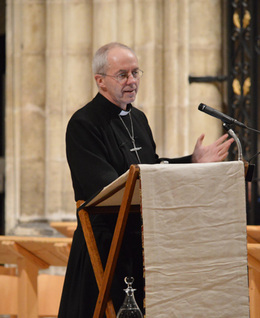Archbishop of Canterbury: 'Have we lost our national nerve?'

A 'disconnection' in society between values and practices is undermining the future of our society, the Archbishop of Canterbury warned last night.
He said there was a need to 'reimagine' British values.
'There is a globally established and ancient reality that the children of privilege tend to inherit privilege, especially in terms of access to health, housing and education.
'There is also a degree to which poverty and deprivation also pass through the generations.'
Referring to inequalities of diet, health, education and quality of life, he said they 'illustrate how far we have allowed a disconnection in our society between values and practices, a disconnection that undermines our futures'.
Such inequalities 'have a long term and chronic impact on life expectancy', Archbishop Justin Welby added.
'The indifference to massive life quality differentials needs to change if we are to have a flourishing future in this country and that means values.'
Public and mental health are increasingly obviously linked, he said. 'Mental health issues afflict those on low incomes as a result of the many pressures and strains of poverty.'
He also warned against rising house prices.
'In housing, if we are to build communities rather than simply build houses, we need to address the dysfunctions caused by ever-rising house prices and the consequent drive to own a house as an investment. We need also to ensure that houses are built and communities developed in such a way as to cause local economies to thrive and thus local people to thrive.'
Welby was delivering the second of his Holy Week lectures at Canterbury Cathedral, with the title: 'Have we lost our national nerve?'
He opened with the story of Peter's denial of Christ.
'Behind any statement of values is the question of what will enable those under pressure to flourish, not merely survive,' Welby said.
He cited Catholic social teaching on 'subsidiarity' and the 'common good' as offering a way forward.
'The values of Catholic social teaching are an expression of what is implicit in our culture when it is at its best; they emerge from the Christian tradition which is our heritage as a nation, and as such also apply throughout Europe and other nations shaped by Christianity.'
Even these values however risk being 'static' in a world which is fluid and changing.
'And that's why the second group of values which seem to me to be implicit in our history and culture are those around courage, a dynamic group of values which relate most closely to the needs of our future and to the nature of human beings.'
These values included aspiration, creativity and competition.
On the third of these, competition, this was something that could lead to human flourishing.
'It's always existed in terms of access to resources, in sport and in entertainments – even when they open the wrong envelope,' he said. 'The benefits of competition in a healthy economy with reasonable regulation are understood by economists as driving up services and improving the efficiency of what happens in economic transactions. And even within the church, St Paul tells the Roman Christians to "outdo one another in showing honour" (Romans 12:10).'











